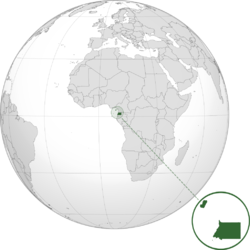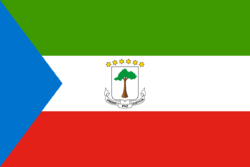Equatorial Guinea
 | |
 | |
| Location | |
| Type | |
| Member of | African Union, La Francophonie, Organisation of African Unity, UN |
| Subpage | •Equatorial Guinea/2004 coup d'état attempt |
| Very small country in Central Africa, between Gabon and Cameroon. Rich in oil. | |
Equatorial Guinea is a small, recently oil rich country in Central Africa.
Contents
History
After becoming independent from Spain in 1968, Equatorial Guinea was ruled by the the brutal President for life Francisco Macías Nguema until he was overthrown in a coup in 1979 by his nephew Teodoro Obiang Nguema Mbasogo, who has been the country's president since.
Since the mid-1990s, Equatorial Guinea has become one of sub-Saharan Africa's largest oil producers, and one of Africa's richest countries per capita[1], even though the oil wealth is distributed extremely unevenly.
It was subject to a failed coup in 2004 which, according to its leader Simon Mann was backed by a small gang of financiers from the UK including Mark Thatcher and Jeffrey Archer.
2004 Coup attempt
- Full article: 2004 Equatorial Guinea coup d'état attempt
- Full article: 2004 Equatorial Guinea coup d'état attempt
In 2004, Simon Mann, funded by Mark Thatcher, Jeffrey Archer and others lead a small team of mercenaries in a coup attempt which failed to install an exiled opposition politician, Severo Moto, as the new president. They had been promised the considerable oil rights of this nation state. Mann turned states evidence and was sentenced to 34 years in prison but released after only five.
In 2017, Simon Mann accused US billionaire George Soros of plotting to overthrow the country's government. He said he had warned President Teodoro Obiang Nguema of the alleged plan in 2011. In his testimony in a Paris court, he also accused William Bourdon, a lawyer for Transparency International, of being part of the plot, as well as exiled opposition leader Severo Moto Nsa and Lebanese businessman Ely Khalil.[2]
Foreign relations
In August 2011, Conservative MP Nadine Dorries led Britain's first parliamentary delegation to Equatorial Guinea. She met with prime minister Ignacio Milam Tang, for which she was criticised in The Guardian.[3]
Forced to take vaccine deal
In April 2011, the US filed a lawsuit under the Kleptocracy Asset Recovery Initiative against EG’s vice-president Teodoro Nguema Obiang Mangue (aka “Teodorin”) – the first son and presumptive heir of President Teodoro Obiang Nguema Mbasogo. In October 2014, Teodorin agreed to relinquish $30m worth of US-based assets. Two-thirds was to go to a charitable organisation that would benefit the country and the rest of the funds forfeited to the US government. After a wrangle over where the money should go, the US decided in 2021 that the money should go to the COVAX global vaccine alliance for distribution of COVID-19 vaccines in the country.[4] The country has received a shipment of 500,000 Sinopharm vaccines from China at the end of June 2021 with more expected to follow.[5]
Event
| Event | Description |
|---|---|
| Equatorial Guinea/2004 coup d'état attempt | A failed coup in Equatorial Guinea with supporters including Mark Thatcher, Jeffrey Archer |
References
- ↑ http://www.indexmundi.com/g/r.aspx?c=mr&v=67
- ↑ https://www.bbc.com/news/world-africa-40420872
- ↑ https://www.theguardian.com/world/2011/oct/23/equatorial-guinea-africa-corruption-kleptocracy
- ↑ https://www.theafricareport.com/118817/usa-equatorial-guinea-forced-to-take-covid-vaccine-deal-as-biden-steps-up-anti-kleptocracy-fight/
- ↑ https://www.africanews.com/2021/08/10/a-step-in-the-right-direction-equatorial-guinea-s-minister-of-mines-and-hydrocarbons-issues-a-mandate-for-oil-and-gas-worker-vaccinations//